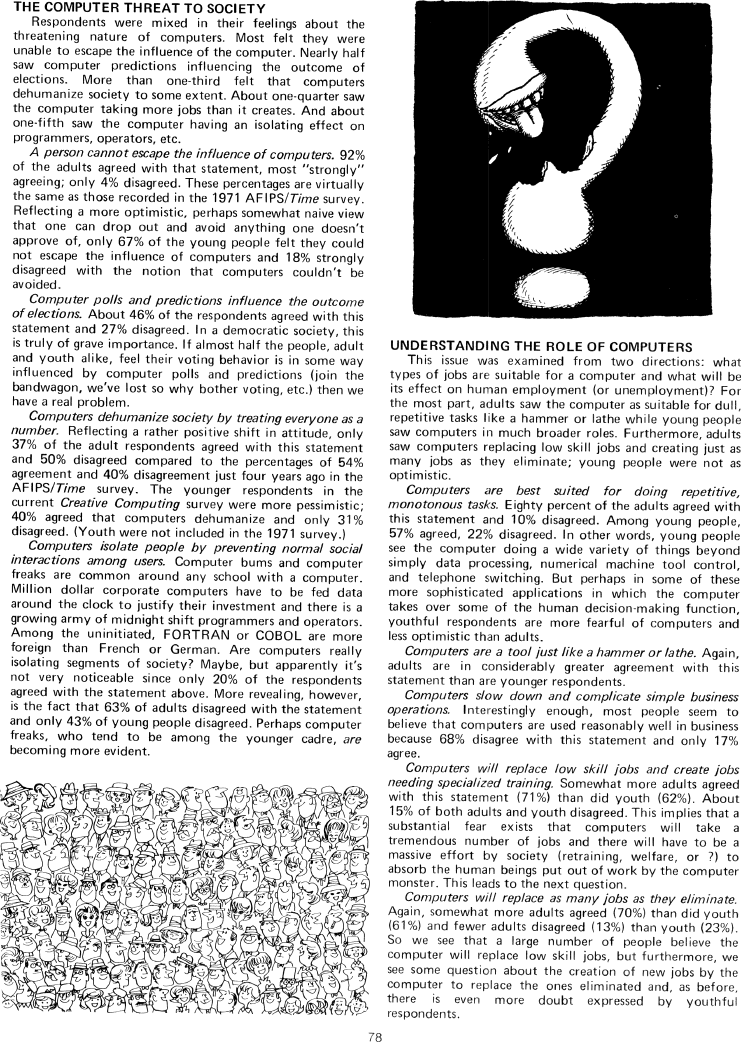The Best of Creative Computing Volume 1 (published 1976)
Survey of Public Attitudes Toward Computers in Society (Computer threat to society, Role of Computers)

THE COMPUTER THREAT TO SOCIETY
Respondents were mixed in their feelings about the
threatening nature of computers. Most felt they were
unable to escape the influence of the computer. Nearly half
saw computer predictions influencing the outcome of
elections. More than one-third felt that computers
dehumanize society to some extent. About one-quarter saw
the computer taking more jobs than it creates. And about
one-fifth saw the computer having an isolating effect on
programmers, operators, etc.
A person cannot escape the influence of computers. 92%
of the adults agreed with that statement, most "strongly"
agreeing; only 4% disagreed. These percentages are virtually
the same as those recorded in the 1971 AFIPS/Time survey.
Reflecting a more optimistic, perhaps somewhat naive view
that one can drop out and avoid anything one doesn't
approve of, only 67% of the young people felt they could
not escape the influence of computers and 18% strongly
disagreed with the notion that computers couldn't be
avoided.
Computer polls and predictions influence the outcome
of elections. About 46% of the respondents agreed with this
statement and 27% disagreed. In a democratic society, this
is truly of grave importance. If almost half the people, adult
and youth alike, feel their voting behavior is in some way
influenced by computer polls and predictions (join the
bandwagon, we've lost so why bother voting, etc.) then we
have a real problem.
Computers dehumanize society by treating everyone as a
number. Reflecting a rather positive shift in attitude, only
37% of the adult respondents agreed with this statement
and 50% disagreed compared to the percentages of 54%
agreement and 40% disagreement just four years ago in the
AFIPS/Time survey. The younger respondents in the
current Creative Computing survey were more pessimistic;
40% agreed that computers dehumanize and only 31%
disagreed. (Youth were not included in the 1971 survey.)
Computers isolate people by preventing normal social
interactions among users. Computer bums and computer
freaks are common around any school with a computer.
Million dollar corporate computers have to be fed data
around the clock to justify their investment and there is a
growing army of midnight shift programmers and operators.
Among the uninitiated, FORTRAN or COBOL are more
foreign than French or German. Are computers really
isolating segments of society? Maybe, but apparently it's
not very noticeable since only 20% of the respondents
agreed with the statement above. More revealing, however,
is the fact that 63% of adults disagreed with the statement
and only 43% of young people disagreed. Perhaps computer
freaks, who tend to be among the younger cadre, are
becoming more evident.
[image]
[image]
***
UNDERSTANDING THE ROLE OF COMPUTERS
This issue was examined from two directions: what
types of jobs are suitable for a computer and what will be
its effect on human employment (or unemployment)? For
the most part, adults saw the computer as suitable for dull,
repetitive tasks like a hammer or lathe while young people
saw computers in much broader roles. Furthermore, adults
saw computers replacing low skill jobs and creating just as
many jobs as they eliminate; young people were not as
optimistic.
Computers are best suited for doing repetitive,
monotonous tasks. Eighty percent of the adults agreed with
this statement and 10% disagreed. Among young people,
57% agreed, 22% disagreed. In other words, young people
see the computer doing a wide variety of things beyond
simply data processing, numerical machine tool control,
and telephone switching. But perhaps in some of these
more sophisticated applications in which the computer
takes over some of the human decision-making function,
youthful respondents are more fearful of computers and
less optimistic than adults.
Computers are a tool just like a hammer or lathe. Again,
adults are in considerably greater agreement with this
statement than are younger respondents.
Computers slow down and complicate simple business
operations. Interestingly enough, most people seem to
believe that computers are used reasonably well in business
because 68% disagree with this statement and only 17%
agree.
Computers will replace low skill jobs and create jobs
needing specialized training. Somewhat more adults agreed
with this statement (71%) than did youth (62%). About
15% of both adults and youth disagreed. This implies that a
substantial fear exists that computers will take a
tremendous number of jobs and there will have to be a
massive effort by society (retraining, welfare, or ?) to
absorb the human beings put out of work by the computer
monster. This leads to the next question.
Computers will replace as many jobs as they eliminate.
Again, somewhat more adults agreed (70%) than did youth
(61%) and fewer adults disagreed (13%) than youth (23%).
So we see that a large number of people believe the
computer will replace low skill jobs, but furthermore, we
see some question about the creation of new jobs by the
computer to replace the ones eliminated and, as before,
there is even more doubt expressed by youthful
respondents.


